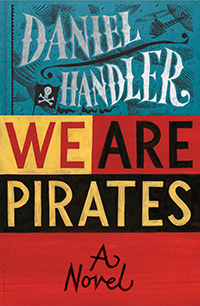Hidden Treasure
In We Are Pirates, Daniel Handler offers the same mixture of weirdness, social satire, and bad behavior that delighted children in A Series of Unfortunate Events
The late John Cheever is sometimes called “the Chekhov of the exurbs” for his gem-like stories that capture the disjointed lives of upper-middle-class Americans: Cheever’s characters are outwardly clever and inwardly suffering, trapped in an age that has lost its traditions and its moral compass. Daniel Handler is best known as Lemony Snicket, the pseudonymous author of A Series of Unfortunate Events, but his new novel for adults, We Are Pirates, bears a great resemblance to John Cheever at the height of his observational powers.
 The novel opens at an uncomfortable Fourth of July barbecue behind an overpriced home with a view of the Bay Bridge. If not for a few clues in the opening pages, it would be easy to mistake the talk of piracy as a Cheeverian metaphor for the malaise of suburban life. Then a fourteen-year-old girl steals a pirate ship and embarks on bloody mayhem in San Francisco Bay, and it becomes obvious that a very different—but equally brilliant—sort of social critic is at this story’s helm. For in this, his fifth novel for adults, Handler gleefully capsizes literary conventions.
The novel opens at an uncomfortable Fourth of July barbecue behind an overpriced home with a view of the Bay Bridge. If not for a few clues in the opening pages, it would be easy to mistake the talk of piracy as a Cheeverian metaphor for the malaise of suburban life. Then a fourteen-year-old girl steals a pirate ship and embarks on bloody mayhem in San Francisco Bay, and it becomes obvious that a very different—but equally brilliant—sort of social critic is at this story’s helm. For in this, his fifth novel for adults, Handler gleefully capsizes literary conventions.
The girl in question is Gwen, the incredibly bored daughter of Phil Needle, a hot-shot radio producer who is married to Marina, a painter and Gwen’s emotionally distant mother. Here is an exchange between mother and daughter about sixty pages into the book, in which Gwen has picked up an apple at breakfast:
“Are you?”
“What?”
“Are you going to eat that, Gwen?”
“I’m eating toast now,” she snarled, then turned to Phil Needle with very fake calm. “Thanks for the toast, Dad.”
This fancy kitchen he could not afford, and it was a minefield.
Marina wouldn’t quit. “Because if you’re not going to eat it—“
“I’m going to eat it.”
“—then you’re wasting apples.”
“I’m going to eat it!”
“They cost money. They don’t grow on trees.”
Phil Needle looked down at the front section of the newspaper, which at the time this story takes place showed a photograph of a senator who was resigning to spend more time with his family.
That phrase, “at the time this story takes place,” is one that will resonate with parents who read the Snicket books aloud—and perhaps with adults who were children themselves in 1998, when the series began. It appears often in Handler’s work but nowhere as often or with such satiric bite as in We Are Pirates. It serves as a refrain, connected to a sequence of observations in which it becomes increasingly clear that something is very wrong at the time this story takes place.
 The solution, which Gwen reaches nearly halfway through the book, is piracy as practiced in the time of Captain Blood and The Sea Witch. She arrives at the pirate’s life by reading these books—and many others in the genre—from a stash beneath the bed of Errol, an elderly man to whom she reads as a punishment for shoplifting.
The solution, which Gwen reaches nearly halfway through the book, is piracy as practiced in the time of Captain Blood and The Sea Witch. She arrives at the pirate’s life by reading these books—and many others in the genre—from a stash beneath the bed of Errol, an elderly man to whom she reads as a punishment for shoplifting.
With a new friend, Amber, and the senile Errol as captain, Gwen concocts a plan to Shanghai a crew and steal a ship. But first she must bust Errol out of the nursing home by defeating Peggy, a classic Handler villain. Freed from the bounds of children’s publishing, Handler can describe Peggy as fittingly as a nursing-home villain deserves: “One narrative, about the hated people in our lands, is that eventually they get what’s coming to them. This is what prisoners have told themselves, the afflicted and the fallen, since the first asshole walked among us, kicking infants and click-click-clicking a ballpoint pen. But Peggy did not fall into a vat of anything ravenous or burning, not then and not ever.”
Once escape is effected and the ship is secured, many of the tropes of pirate literature begin to hold sway in Gwen’s life: sword fights, a storm at sea, treachery among the crew, a surprising plot twist. Her father, meanwhile, is at sea himself, though more in the Cheeverian sense of the phrase, as he suffers through an interminable business trip while contemplating adultery.
Father and daughter inevitably drift toward reunification, one firmly in California, another firmly in a place that can exist only in books, and both in the hands of a mysterious first-person narrator: “This history is not a tragedy, despite its gore and its finale, and neither is it a comedy,” the narrator tells us. “At the time this story takes place, it likely would have been classified as a human interest story, on the grounds that humans would be interested in it.” The narrator is never identified, but he sounds a lot like Lemony Snicket, older, wiser, and exiled to a most uncomfortable time.

Michael Ray Taylor teaches journalism at Henderson State University in Arkadelphia, Arkansas. He is the author of several books of nonfiction and coauthor of a forthcoming textbook, Creating Comics as Journalism, Memoir and Nonfiction.


